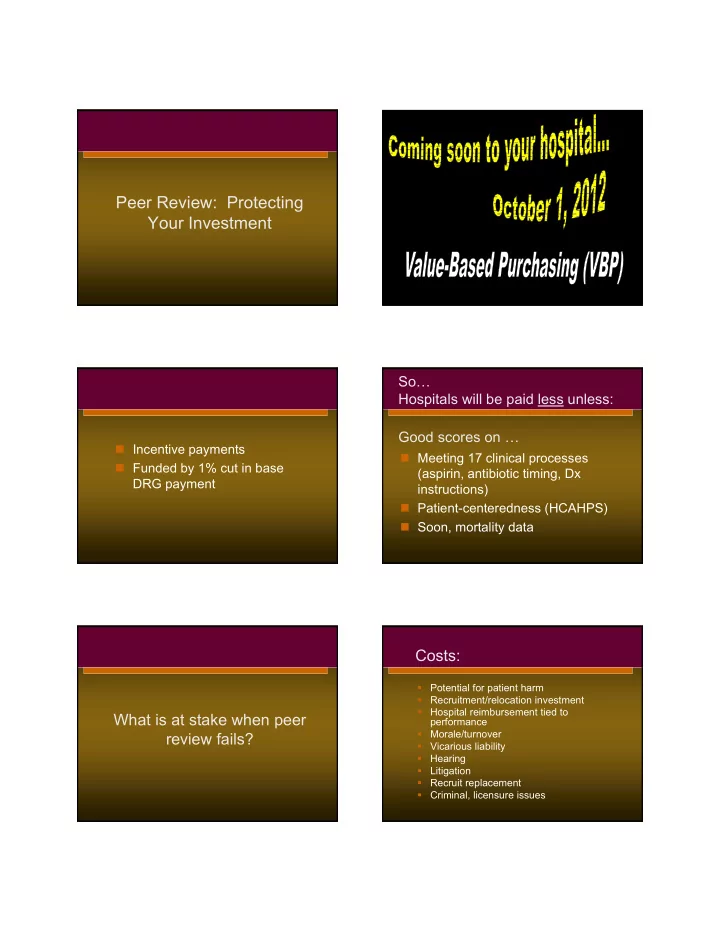

Peer Review: Protecting Your Investment So… Hospitals will be paid less unless: Good scores on … Incentive payments Meeting 17 clinical processes Funded by 1% cut in base (aspirin, antibiotic timing, Dx DRG payment instructions) Patient-centeredness (HCAHPS) Soon, mortality data Costs: Potential for patient harm Recruitment/relocation investment Hospital reimbursement tied to What is at stake when peer performance Morale/turnover review fails? Vicarious liability Hearing Litigation Recruit replacement Criminal, licensure issues
Licensure Action Unprofessional conduct in the practice of medicine In the Matter of Willfully making a false report or record in the practice of medicine Mark G. Midei, M.D. Gross overutilization of health care services Violations of the standard of quality care Failure to keep adequate medical records Implanted cardiac stents unnecessarily Dr. Midei was present for Falsified the extent of blockage of the proceedings and was the patients’ coronary arteries by represented by nine attorneys. reporting that it was 80% when it was in reality lower – much lower Falsely reported that they suffered from unstable angina “Dr. Midei was not paid per stent inserted…was employed under License revoked July 13, 2011. circumstances in which any May not apply for reinstatement employee would feel at least some for two years. pressure to produce a high volume of stents.”
How Did the Board Know? Anonymous letter from Hospital Dr. Midei claimed he was employee. suspended by hospital to deflect attention from its own fraud investigation. The outside reviewer was Dr. Chacko was subjected to impressive to the state board unacceptable harassment and intimidation by [Dr. Midei’s hearing officer. attorney]. Throughout Dr. Chacko’s testimony, Mr. Dr. Chacko quickly and dispassionately Snyder repeatedly interrupted, attempted to corrected him. When a lawyer asking the confuse, demean, and bully him, and made questions became confused about the subtly threatening comments to him. Mr. symptoms and treatment of the five patients at Snyder’s many attempts to rattle Dr. Chacko issue, Dr. Chacko had complete, accurate were unsuccessful. I found Dr. Chacko to be recall of all of the relevant facts. Dr. Chacko extremely knowledgeable and thoroughly did not exhibit any animus toward [Dr. Midei], professional. He never became agitated, no and he acknowledged [Dr. Midei’s] status in matter how many times Mr. Snyder insulted the medical community. For all of these him. When Mr. Snyder asked Dr. Chacko a reasons, I have given Dr. Chacko’s testimony question which assumed facts not in evidence great weight. or misstated his testimony, …
Dr. Chacko was paid $1,400 for his Midei claimed Dr. Chacko’s report and expert testimony. report was “paid for.” (Dr. O’Neill (Dr. Midei’s expert) was paid more than twenty times that much.) The violations proven were repeated and serious. Although none of the patients suffered any adverse consequence, such as bleeding or blood clots, as a result of [Dr. Midei’s] care, one of the patients Disciplinary proceedings suffered a tear in an artery, requiring the against a physician are not placement of another stent, and the intended to punish the offender patients were required to take Plavix for but rather to protect the public. a year and aspirin for life after their stents were inserted. [Dr. Midei] unnecessarily exposed patients to risk of harm. This factor warrants a severe sanction. …before these charges became [Dr. Midei’s] practice of inserting public, [Dr. Midei] was a recognized stents increased the cost of the patients’ leader in the medical and cardiology medical care to the health care system. communities in Maryland. He has a PCI is much more expensive to a patient, the Medicare program, and insurers than body of work over a professional medical therapy. lifetime that, before this case, any doctor would be proud to own.
Traditional “peer review”: Retrospective [Dr. Midei] was a salaried employee at SJMC; he had no apparent Subjective financial motive for his conduct. He No sufficient interaction was devoted to his profession, Novice reviewers respected by his peers and co- Personal workers, and had a loyal following of No end point/trend referring physicians. Fear of litigation The Joint Commission calls it: We call it: OPPE Professionalism/ FPPE Lifelong learning Continuous Professional Performance Process Orientation Set clear, high standards* It must start earlier Preceptor/mentor Replace “lost” hours of training *Requires bylaws change/contract language
How? Mutual Benefits Multiple input process Physicians Employees Gives each physician the Patients (www.cahps.ahrq.gov) best chance to be successful Protocol/guideline compliance Maintain currency Reviewers’ CME Medical necessity (compare with Dartmouth/Dx statistics) Sentinel events/never events Specialty-specific indicators What? What? Triage: Identify system issues System issues Share data/information with physicians Conduct (de-identified) Health Educational letters/follow-up Quality PIPS Progressive discipline (bylaws change) Role of Management Role of Board Assure resources for ongoing process Ultimate responsibility Assure Determine if it is contract/employment a good process issue participants are trained and diligent system issues identified and correction plan implemented Require conformance to quality and safety initiatives Require reports on unusual or long-standing problems
Who serves on committee? Role of Medical Staff Physician leaders with training Participants must be: Quality Director Accountable MSP Well trained PMG CMO Compensated? Peer Review Privilege Attaches to Medical Staff, but to PMG? What if problem is with Documentation matters – keep out of PMG physician? employment files Required Documents to Clarify Who finally acts? and Guide Process Information Sharing Agreement Release Employer? Contract Language PPEC? Bylaws Language Policy on Performance Review Based on Established Benchmark Data
Beneficiaries → Tweaking current system won’t Patients work Physicians → Bylaws/contracts must require compliance Hospital → Standards must be clear → PPEC must be trained, vigilant
Recommend
More recommend